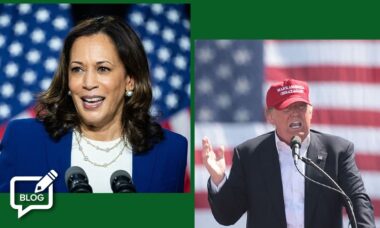 As the US cannabis sector prepares for the economic impact of an announced reclassification of marijuana to a less-restrictive schedule, the country’s presidential contest seems to have already turned cannabis into a business opportunity worth supporting.
As the US cannabis sector prepares for the economic impact of an announced reclassification of marijuana to a less-restrictive schedule, the country’s presidential contest seems to have already turned cannabis into a business opportunity worth supporting.
For the first time since she entered the presidential race as a candidate, Kamala Harris has pledged federal legalisation of cannabis, presenting it as an economic opportunity from which African American men, whose votes she’s now targeting, should not be excluded.
The Democratic presidential candidate said that her newly announced Opportunity Agenda for Black Men will “legalise recreational marijuana and ensure that all Americans have opportunities to succeed as this new industry takes shape”.
Jobs and wealth for Black men?
Harris’s personal stance in favour of the decriminalisation of recreational cannabis is not new. Only a couple of weeks ago, she publicly said she believed cannabis should be legalised while speaking on popular podcast All the Smoke, hosted by former US National Basketball Association (NBA) stars Stephen Jackson and Matt Barnes.
However, American voters, including African American men, had to wait until just three weeks before the elections to officially hear about Harris’s intentions on the matter, with marijuana being used as a tool to attract non-white male votes under a promise to “break down unjust legal barriers that hold Black men and other Americans back”, as announced by the Harris campaign.
The campaign said its nominee, if elected, would work with Congress “to ensure that the safe cultivation, distribution and possession of recreational marijuana is the law of the land” and that she will fight for the establishment of a national cannabis industry so that Black men “who have, for years, been overpoliced for marijuana use” can access “wealth and jobs” in the new market.
Marking territory
It is certainly refreshing to hear about plans for a flourishing new market where racial discrimination and criminalisation will be replaced by equal opportunities of employment and revenue. But it is not quite clear whether and how a renewed Democratic government would turn a still scheduled substance and criminalised behaviour, for which a disproportionate percentage of non-white people have so far ended up in prison, into a legal market, let alone a wealthy and equal one.
The section of the Harris campaign’s newly presented agenda concerning cannabis legalisation sounds very much like an attempt to reclaim a traditionally non-Republican supporting role towards cannabis that former president and current Republican nominee Donald Trump may have been trying to mildly usurp through his declarations ahead of the legalisation measure on Florida’s 5th November ballot.
While Trump didn’t openly advocate for the legalisation of cannabis but only said its use should not be criminalised in Florida while it’s legal in other states, he also highlighted how “lives are being ruined” and taxpayer money is being spent to send people to jail for carrying small amounts of marijuana for personal use.
Waiting for the new president
For the time being, the only certainty and potentially positive change ahead is the economic impact of a yet-to-be green-lit reclassification of marijuana from Schedule I to III following an agreement between the Drug Enforcement Administration (DEA) and the Department of Health and Human Services earlier this year.
The current administration under president Joe Biden was widely praised for a change that would eliminate a number of significant tax restrictions, thereby increasing the profitability of businesses in the cannabis sector. However, no further details over this measure will be defined before a hearing the DEA has scheduled for December.
This could mean that the process will not be completed before a new president is already in charge.
– Tiziana Cauli CannIntelligence staff
Photo: The White House, Gage Skidmore







